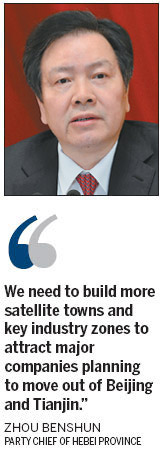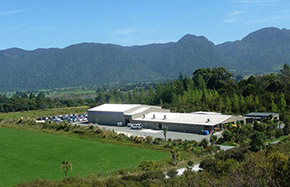Hebei looks to tap into success of neighbors
Province's Party chief hoping to lure businesses from Beijing and Tianjin
Hebei, the province that has traditionally provided all-round support for the development of Beijing and Tianjin, is now looking to benefit from their development with a new round of reforms and opening-up.
"We need to build more satellite towns and key industry zones to attract major companies planning to move out of Beijing and Tianjin," said Zhou Benshun, Party chief of the province, at a meeting of the provincial Party committee on Wednesday in Shijiazhuang.
The meeting outlined the guidelines for the future development of the province.

The province aims to take advantage of the two municipalities' development by providing a good investment environment and building at least one zone in every city in the province to attract companies looking or forced to move. Cities neighboring the nation's capital will try to take advantage of their location to develop tourism, ecological agriculture and other services.
Hebei attracted more than 219 billion yuan ($35.65 billion) from Beijing, which accounted for 43 percent of its total external investment last year.
The building of a new airport in Langfang will boost the city's cooperation with Beijing, and it is expected to be a new engine for the province's growth.
Hebei is trying to consolidate its status as a major economy in China through industrial upgrading and innovation.
"We need to free our minds and think outside the box, and get stronger motivation from continuing reform and opening-up," Zhou said.
In the past there were complaints that Hebei found it hard to compete with Beijing and Tianjin.
"But this is no longer the case," said Zhou.
It now wants to take advantage of its location between Beijing and Tianjin to adsorb their spillover and attract companies that are moving out.
Hebei was China's sixth-largest economy in 2012, but it has lagged behind the neighboring municipalities and provinces in recent years. And despite being a coastal province, the economy is not as open as other coastal areas. Its foreign investment in actual use was $6.03 billion, only 16.9 percent of that in Jiangsu province, for instance.
Zhou said the areas with greatest development potential were the coastal areas, such as the city of Qinhuangdao.
Located in Bohai Bay, Qinhuangdao is a major port for the transport of coal. Now the western part of the port is moving out of the city to protect the environment and it will have larger development space.
"We will take this opportunity to upgrade the port, introducing more industries and services, such as logistics companies and high and new technology companies, as well as other services," said Feng Guolin, Party chief of the district where the port located.
He said the city will hold many trade fairs in foreign countries to boost awareness, but he said that not all companies would be welcome in the port.
"We will pick those that are environmentally friendly and have good growth potential, such as photovoltaic companies."
The relatively low economic growth and degraded environment have added to the province's development pressures. Li Zhong, Party chief of Qian'an city in Tangshan, which is known for its heavy industry, said that the province must upgrade its industrial structure.
"In the short term, jobs from steel or coal factories may be cut after they adopt new technology or improve their operations, but it's good for sustainable economic development in the future," he said.
To bring more jobs to Qian'an, one of the strongest economies in Hebei, the city is encouraging the service sector.
"It creates more jobs and improves the economic structure," Li said.
Other cities are also looking to the service sector. Zhang Jinbo, Party chief of Sanhe, a city that is another strong player in the provincial economy, said the government is looking to encourage the tertiary sector by introducing reforms to reduce red tape in the application process for companies to motivate more people to start up a business.
Meanwhile, Hebei Iron & Steel Group, the leading heavy industry in the province, is adopting green technology and policies, to remain competitive.
"We didn't just introduce advanced equipment. We also improved our approach to development and our management system," said Wang Yifang, the CEO of the group.






















